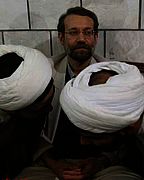Hardliners Too Join Supporters of Talks with the US
» Ali Larijani: Do Not Misinterpret the Meaning of Heroic Flexibility
Amid Majlis speaker’s call not to make the wrong interpretation of ayatollah Khamenei’s remarks about “heroic flexibility, there are positive signs regarding the will of the governments of the US and Iran to resolve the nuclear crisis. Iran’s foreign minister who is in New York now has also confirmed this. And a hardline Iranian official who had always been staunchly against any talks or agreement with the world and was among the unwavering supporters of former president Ahmadinejad’s rhetoric, Guards commander general Naghdi made an unprecedented turn around and called for using the “diplomatic potential.” At the same time, Kayhan newspaper, which is the mouthpiece for the hardline faction of the Islamic regime, continued its reticence regarding talks with the West.
Speaking at the inauguration ceremony of the 2nd phase of Razavi specialized hospital in Mashad, Majlis speaker Ali Larijani took advantage of the gathering to express his views on the unexpected changes in favor of diplomacy between Iran and the West. “The Islamic republic of Iran has been through nuclear negotiations and will never desert the negotiations table. The supreme leader recently presented the notion of heroic flexibility so officials should use this opportunity in the most reasonable way,” he said.
Ayatollah Khamenei’s remarks about launching “heroic flexibility” in talks with the West are a turnaround from his talk on February 11 when he said, “I am a revolutionary not a diplomat.”
In his talk, Larijani also warned that ayatollah Khamenei’s term of “heroic flexibility” should not be misunderstood. “Heroic flexibility is a tactical change and not a strategic one. At the current time, the administration is pursuing the logic of talks while the strategy of the regime regarding the nuclear issue will never change. Heroic flexibility is the new honorable strategy and tactic,” he said.
Tehran and Washington have in the last few days been showing tangible signs in their readiness to end their 34 animosity and hold direct talks. There is even some talk of a possible “accidental” contact between Barak Obama and Hassan Rowhani during Tuesday’s talks by each of them at the UN General Assembly.
In his latest interview that was aired on Thursday on NBC, Rowhani said that he had full authority from ayatollah Khamenei to decide on the nuclear issue. Some have interpreted this to mean that the supreme leader has even given the new president permission to hold direct talks with US officials.
According to Persian language Radio Farda, a White House spokesperson on Friday announced that, “So long as the Islamic republic was willing to show that it was pursuing a non-military goal in its nuclear program, the US would be ready to talk with Iran on the basis of mutual respect.”
Iran’s foreign minister Mohammad Javad Zarif met UN Secretary General Ban Ki-moon in New York and conveyed Tehran’s determination to engage the P5+1 to find a peaceful solution to the nuclear issue in a manger that would guarantee Iran’s right to nuclear energy.
Naghdi Welcomes Diplomacy
In this new atmosphere of friendly talk, even some hardline officials of the Islamic republic such as Revolutionary Guards commander Mohammad-Reza Naghdi, who during the presidential campaign earlier this year issued warnings to candidates about “compromising” with the West, and continued this posture even after the election of Rowhani who was the reformers’ candidate of choice, has softened his stance and turned to support diplomacy over the nuclear talks with the West. He has called for the use of diplomacy to attain the goals of the country and added that “heroic flexibility” was not a strategy but an approach to utilize other potentials.
Kayhan newspaper, whose editor is directly appointed by ayatollah Khamenei and which is widely viewed as the mouthpiece for the hardliners of the regime, did not take a public position on the new impetus for talks with the West. At least not for now.

